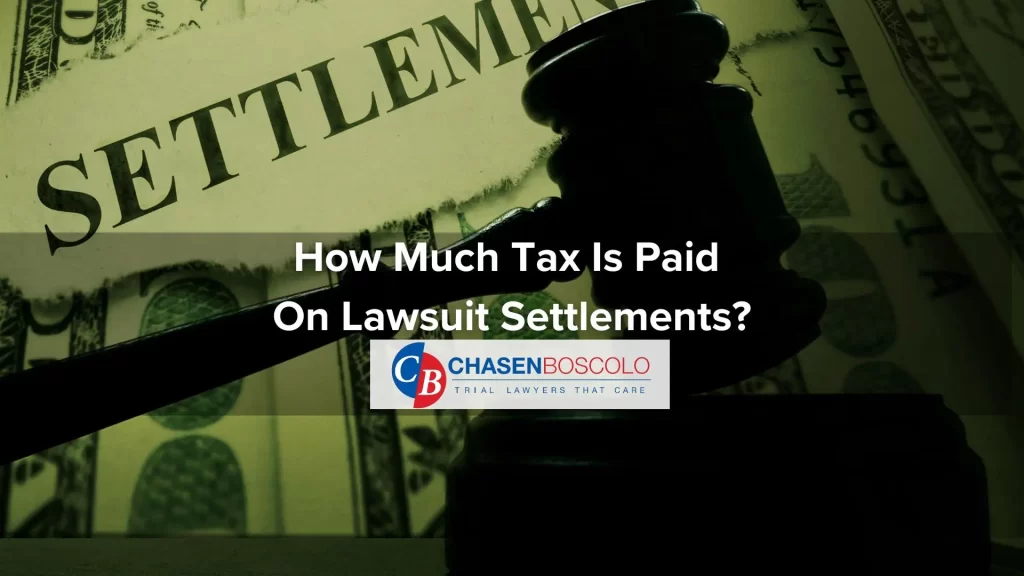Dec 01, 2022 | CHASENBOSCOLO
 After you’ve been injured in an accident someone else caused, you and your attorney will pursue compensation from the at-fault party’s insurance company. The parties will enter settlement negotiations to resolve the claim. A portion of your settlement compensation may be subject to taxes. The amount of tax you’ll pay depends on the size of the taxable portion of your settlement.
After you’ve been injured in an accident someone else caused, you and your attorney will pursue compensation from the at-fault party’s insurance company. The parties will enter settlement negotiations to resolve the claim. A portion of your settlement compensation may be subject to taxes. The amount of tax you’ll pay depends on the size of the taxable portion of your settlement.
What Is a Settlement?
A settlement is an agreement between parties to resolve an open claim. The at-fault party pays money to the injured party to compensate for the injured party’s losses. In the case of a personal injury case, the money from the settlement agreement is meant to cover the injuries and financial losses the injured person suffered due to the at-fault party’s wrongdoing.
Federal Law on Settlement Monies
Internal Revenue Code (IRC) §61 provides that taxable income includes any “income from whatever source derived” unless otherwise exempt within the Internal Revenue Code (IRC). This means that any money received for any reason could constitute taxable income unless the IRC provides that it is exempt.
For example, IRC §104 provides that amounts received for personal injuries or sickness are not taxable. This means that compensation for medical expenses linked to an accident will likely not be taxable under the IRC. However, this does not mean that all monies received because of a physical injury or sickness will be tax-exempt, so itemizing the kinds of compensation you receive and the amounts of each when drafting a settlement agreement is important.
How Much Tax is Paid on Lost Wages
If your accident-related injury kept you from working and earning wages, you might obtain compensation for those lost wages in your settlement. According to documentation from the IRS, those lost wages are not taxable if the payment was compensation for physical injuries caused by someone else.
Income Tax on Compensation for Economic Losses
Aside from lost wages, you’ll incur other economic losses after an accident caused by someone else. These losses have specific assigned values. Money you receive in a settlement in compensation for these losses is usually not taxable. Economic losses include things like:
- Medical expenses
- Modifications to your home
- Home health care, if required by your injuries
- Household assistance
- Assistive devices
- Property damage
Income Tax on Mental and Emotional Distress Compensation
You will also likely incur losses without a specific monetary value after you were injured in an accident caused by someone else. These are called “non-economic losses,” including intangible losses like pain and suffering. Under IRC §104(a)(2), compensation you recover for mental and emotional distress in a personal injury case is not considered taxable income. Any portion of your settlement identified as non-economic compensation should not be taxable. Non-economic compensation can include money for:
- Pain and suffering
- Post-traumatic stress disorder
- Anxiety
- Loss of enjoyment of life
- Depression related to the accident
How Much Tax is Paid on Punitive Damages
Punitive damages are only awarded by a judge or jury so you won’t receive punitive damages in a settlement. If your case goes to trial and you are awarded punitive damages, you should know that they are considered taxable income.
However, under IRC §104(c), if you obtain compensation in a wrongful death claim and the court awards punitive damages, that compensation will be excluded from your gross income.
Contact an Experienced Personal Injury Lawyer
While not all personal injury cases are settled outside the court system, most claims result in a settlement agreement. If you have been injured in an accident someone else caused, you should contact an experienced personal injury attorney from CHASENBOSCOLO. Our seasoned attorneys will meet with you to understand the circumstances of your accident and advise you about your legal options.
When you hire us, we will investigate the accident to determine who was at fault for your injuries and losses. Our attorneys will gather all available evidence to prove who was at fault and show the extent of your injuries. We’ll assess the total value of your claim and pursue full and fair compensation for your injuries. Our lawyers will negotiate with the at-fault party’s insurance company to get the best settlement possible, and if that doesn’t work, we can take your case to court. We’ll advise you on how much tax you will likely owe on your settlement or award.
We have a reputation for excellent legal representation for our clients. We are always here to fight for your best interests. Contact us at (301) 220-0050 or contact us online for a free consultation today.
Related Posts
Beyond The Criminal Case: How Civil Lawsuits Help Sexual Assault Survivors Find Justice






